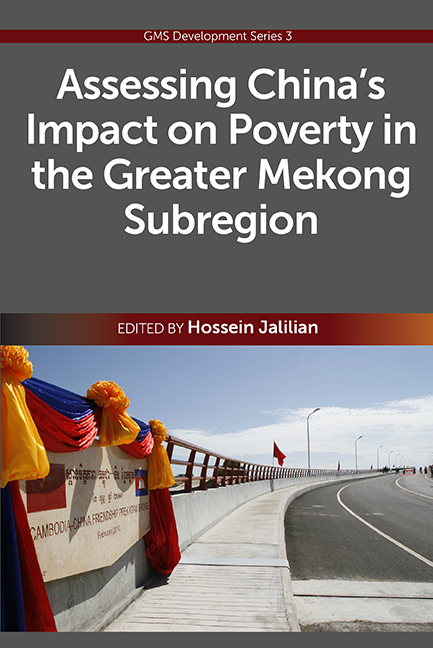Book contents
- Frontmatter
- Contents
- List of Figures, Tables and Boxes
- Foreword
- List of Contributors
- PART I The Context
- 1 Assessing China's Impact on Poverty in the Greater Mekong Subregion: An Introduction
- 2 Assessing China's Impact on Poverty Reduction in the Greater Mekong Subregion: Literature Review
- PART II CHINA AND THE GMS-4
- PART III THE GMS-4 AND CHINA
- Index
1 - Assessing China's Impact on Poverty in the Greater Mekong Subregion: An Introduction
from PART I - The Context
Published online by Cambridge University Press: 21 October 2015
- Frontmatter
- Contents
- List of Figures, Tables and Boxes
- Foreword
- List of Contributors
- PART I The Context
- 1 Assessing China's Impact on Poverty in the Greater Mekong Subregion: An Introduction
- 2 Assessing China's Impact on Poverty Reduction in the Greater Mekong Subregion: Literature Review
- PART II CHINA AND THE GMS-4
- PART III THE GMS-4 AND CHINA
- Index
Summary
Since the dawn of the industrial revolution, and the ushering in of an era of global economic relations, the United States and Europe have been the core poles of economic power. However, China along with India and a select group of other rapidly developing (and mostly East Asian) countries are increasingly challenging the traditional economic hegemony. Such is the level and significance of this challenge that Gu, Humphrey and Messner (2008, p. 275) are moved to assert that this generation is “witnessing a fundamental shift in power centres in the global economy”. Indeed, in 2010, in a moment laden with symbolism, China eclipsed Japan to become the world's second largest economy, cementing its position as one of the globe's foremost economic powerhouses.
An issue of great importance is how this shift in the global economic balance of power will affect developing economies, and in particular the poor residing within them. Developing countries will be offered opportunities by China's growth, but also face challenges. It is important to identify the likely routes of impact so policy can be designed to optimize opportunities and lessen the potential for negative impacts. Nowhere are these issues more relevant than in the transition economies of the Greater Mekong Subregion (GMS), which are located in China's backyard and deeply integrated into its economy through regional supply chains. This volume examines the relationship between transition economies and the rise of China through presenting empirical case studies from the GMS. In doing so, it offers insights into the effect of China on developing countries in general, and offers practical policy directions for the place-specific economies of the GMS.
This chapter starts by giving an overview of the Chinese economy and the key routes through which its rise may affect developing countries. It then focuses on the relationship between China and the GMS, and highlights the key issues that may arise from economic interaction. A method to analyse China's impacts on poverty in the GMS is then forwarded; which informs the empirical studies that follow. The results of the case studies presented in this volume are then surmised, and the organization of the following chapters is detailed.
- Type
- Chapter
- Information
- Publisher: ISEAS–Yusof Ishak InstitutePrint publication year: 2013

